By Chris Stoate, Allerton Project Head of Research
The Agriculture and Horticulture Development Board (AHDB) runs a network of Arable Business Groups across the country, enabling farmers from the same area to benchmark the economic performance of their cropping against each other, and against regional and national averages. It's a great initiative that stimulates discussion within the group about how we each approach our cropping systems. It is an opportunity for us to learn from each other, as well as from AHDB expertise, and from invited speakers.

The Welland Arable Business Group was formed in 2015. Its members have a wide range of business types including various forms of tenure, a range of farm sizes, and some representation of livestock in the predominently arable systems.
Low crop prices and increasing input costs, coupled with the impending but unkown changes associated with Brexit, mean that profitability is elusive and the future, uncertain. Add to that the vagaries of the weather and exchange rates and maintaining a viable business becomes even more challenging. This certainly focuses the mind on reducing input costs and making the most of existing assets, but at the same time, makes investment in new equipment and strategies difficult.
Soil is the most fundamental resource of most farm businesses and one of the messages to come out of our discussions within the group is that we need to improve our management of it. The drive for ever larger machinery, combined with more frequent intense winter rains, and a decline in soil organic matter, all contribute to deteriorating soil conditions and reduce our capacity for both economic and environmental sustainability.

Soil Organic Matter (%) on farms in the upper Welland river basin
Loss of soil organic matter is something that group members have identified as being of concern, and we have been able to help by carrying out surveys of organic matter across farms in the upper Welland. This provides a baseline against which individual farms can evaluate any changes they make in their soil management. Most are currently well below the 5% considered to be desirable for effective soil function in terms of crop rooting capacity, nutrient uptake and summer moisture retention.
Our new EU funded SoilCare research project provides an opportunity for us to explore, with local farmers, new approaches to soil management that could help to improve farm profitability, while also delivering public benefits such as improved water quality, and reduced flood risk, all work that links neatly with our other ongoing research projects.
Group members are not passive recipients of the research results, but have an active role from the start. In fact, it is the farmers who are setting the research agenda by identifying and prioritising the areas of greatest relevance and interest to their businesses. Farmers will continue to be actively engaged in the research as it develops. This approach ensures that the research we carry out as the UK site in this European project will also be relevant to other farmers across much of lowland England.
 Free weekly newsletter
Free weekly newsletter
Stay updated and get all the latest GWCT blog updates and news delivered straight to your inbox each week.
Sign up FREE to the Weekly GWCT Newsletter >